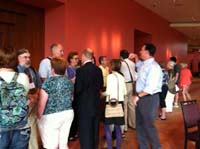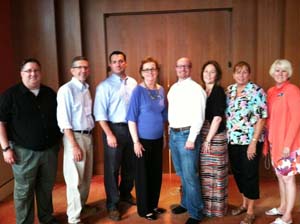NSTA's 2013 National Congress on Science Education
By Lauren Jonas, NSTA Assistant Executive Director
Posted on 2013-07-22
Puerto Rico, home to the largest radio telescope in the world, played host to NSTA’s 2013 National Congress on Science Education (NCSE) last week. While a visit to the Arecibo Observatory was on many of the attendees’ schedules, their real work was focused on identifying key issues affecting science teachers throughout the United States. The theme for the week was “Building and Sustaining Teacher Leaders in Science, Standards, and Literacy.” Delegates from NSTA Chapters and Associated Groups and the NSTA Board and Council met to discuss implementation of the Next Generation Science Standards (NGSS), elementary science education, the inclusion of engineering in the science curriculum, and literacy and the Common Core State Standards (CSSS).
 The meeting kicked off on Wednesday, July 17th when delegates from the State Chapters swapped success stories and compared notes in a “speed networking” event. That evening, the NCSE was honored to receive a delegation from the office of the Governor of Puerto Rico. Dr. Manuel Nuñez Negrón, Advisor in Education, Office of the Governor of Puerto Rico and Ms. Anna Alamañy, Assistant Advisor in Education, Office of the Governor of Puerto Rico, addressed the crowd. They welcomed our science teachers and talked about the education system in Puerto Rico and mutual educational challenges and opportunities.
The meeting kicked off on Wednesday, July 17th when delegates from the State Chapters swapped success stories and compared notes in a “speed networking” event. That evening, the NCSE was honored to receive a delegation from the office of the Governor of Puerto Rico. Dr. Manuel Nuñez Negrón, Advisor in Education, Office of the Governor of Puerto Rico and Ms. Anna Alamañy, Assistant Advisor in Education, Office of the Governor of Puerto Rico, addressed the crowd. They welcomed our science teachers and talked about the education system in Puerto Rico and mutual educational challenges and opportunities. That night many of the delegates headed to Old San Juan where they soaked up the scenery, tested their Spanish, and had some great Mofongo (the island’s famous dish based on fried plantain).
That night many of the delegates headed to Old San Juan where they soaked up the scenery, tested their Spanish, and had some great Mofongo (the island’s famous dish based on fried plantain).On Thursday, July 18th, NSTA President Bill Badders oversaw the general session, in which minutes were read, operating policies were discussed, and the resolutions process was explained. And then it was time for the heavy lifting to begin! Throughout the day attendees focused solely on Next Generation Science Standards and were provided with an in-depth overview of the standards, a status update on the NGSS/CCSS/Framework, and a discussion of what NSTA is doing for science teachers to help them understand and implement them in their states and districts.
A plenary session led by former NSTA President Harold Pratt looked at the past, present, and future for the NGSS, and and the current—and future—resources that NSTA will offers to Chapter and Associated Groups.
Later in the day, delegates broke into issue forums, where they could take a deep dive into some of the most pressing issues in Science Education.
The first Issue Forum, lead by two members of the NCSE Planning Committee—Steven Walvig and Barbara Pietrucha—examined NGSS science and engineering practices and inquiry, and what teachers would need to successfully incorporate these into classroom teaching.
 Issue Forum B: Elementary was led by NSTA District Director Chris Campbell and facilitated by NSTA District Director Pat Ruane. The group recognized that elementary educators play a vital role in science education and face many challenges and obstacles. These challenges are compounded when science is not a “high-stakes” subject on many state standardized tests. The talk was all about how NSTA and Chapter and Associated Groups can help elementary science educators in laying a strong STEM foundation.
Issue Forum B: Elementary was led by NSTA District Director Chris Campbell and facilitated by NSTA District Director Pat Ruane. The group recognized that elementary educators play a vital role in science education and face many challenges and obstacles. These challenges are compounded when science is not a “high-stakes” subject on many state standardized tests. The talk was all about how NSTA and Chapter and Associated Groups can help elementary science educators in laying a strong STEM foundation. Issue Forum C: Engineering was moderated by NSTA District Director Eric Brunsell and Stan Hart. The Framework and Next Generation Science Standards raises the profile of engineering and engineering design as part of the science curriculum. In this forum, participants explored the ramifications and opportunities related to the inclusion of engineering in the science curriculum.
Issue Forum C: Engineering was moderated by NSTA District Director Eric Brunsell and Stan Hart. The Framework and Next Generation Science Standards raises the profile of engineering and engineering design as part of the science curriculum. In this forum, participants explored the ramifications and opportunities related to the inclusion of engineering in the science curriculum. Issue Forum D: Literacy and the Common Core was led by NSTA District Director Vicki Massey and moderated by Christine Royce. Science teachers are now expected to meet specific Common Core English Language Arts Literacy Standards in their science classrooms. These include standards relating to writing and reading in science content areas. This informative and timely forum delved into what this means for teachers of science.
Issue Forum D: Literacy and the Common Core was led by NSTA District Director Vicki Massey and moderated by Christine Royce. Science teachers are now expected to meet specific Common Core English Language Arts Literacy Standards in their science classrooms. These include standards relating to writing and reading in science content areas. This informative and timely forum delved into what this means for teachers of science.During the Issue Forums, Congress delegates took notes and drafted resolutions pertaining to the specific topics discussed. The resolutions that were generated from the Issue Forums ranged from recommendations to create additional NGSS resources for teachers, develop ancillary materials and professional learning specifically for elementary teachers, and better ways to share information with state chapters. On Friday, Congress delegates voted to approve or table many of the 23 motions generated from the Issue Forums. These resolutions were then discussed and approved (or tabled) by the NSTA Council, and finally the NSTA Board of Directors (we will focus on the complete list of resolutions that were approved by the Board in a future blog).
Also on Friday, state chapter leaders took advantage of a number of workshops geared to helping to strengthen and grow their state groups. Workshops focused on the NSTA Learning Center, Association Management, Parliamentary Procedure, Social Media and eMessaging, legislative advocacy on the state level, and Fiscal Responsibility.
 Saturday, July 20th was filled with more workshops focused on NGSS scientific and engineering practices and crosscutting concepts, technology for associations, and the NSTA Learning Center.
Saturday, July 20th was filled with more workshops focused on NGSS scientific and engineering practices and crosscutting concepts, technology for associations, and the NSTA Learning Center.In the end, this Congress represented 38 chapters and association groups from throughout the United States. We made great progress in identifying strategies to address the most pressing issues in science education today. And at the same time, we learned about the wonders of Puerto Rico. As expected, our hosts were incredibly hospitable, and we learned why they call this the “Island of Enchantment.” Even the creatures in El Yunque rain forest are astonishing–as seen in this incredible shot captured by NSTA Division Director Steve Rich.
Disclaimer: The views expressed in this blog post are those of the author(s) and do not necessarily reflect the official position of the National Science Teaching Association (NSTA).



